Book contents
- Frontmatter
- Contents
- Acknowledgments
- List of Abbreviations
- Introduction: Imagining South Asian Futures
- Section I South Asia as a Region
- Section II State Relations
- Section III Development
- Section IV Human Well-Being
- Chapter 27 Population Dynamics, Economic Prospects and Regional Coherence
- Chapter 28 Towards Cooperation for Poverty Reduction?
- Chapter 29 Health Challenges
- Chapter 30 Regional Disease Dynamics
- Chapter 31 Education: Time Bomb or Silver Bullet?
- Chapter 32 Scholarship in and on South Asia
- Chapter 33 Rights and Justice: A Prospective View
- Chapter 34 Patriarchy, Power and Paradox: Dreaming Gender Equality and Development
- Chapter 35 Women in South Asia
- Chapter 36 Media: New Trends, Old Problems
- Chapter 37 Sports: Passion and Industry
- About the Authors
- Bibliography
- Index
Chapter 33 - Rights and Justice: A Prospective View
from Section IV - Human Well-Being
Published online by Cambridge University Press: 05 September 2013
- Frontmatter
- Contents
- Acknowledgments
- List of Abbreviations
- Introduction: Imagining South Asian Futures
- Section I South Asia as a Region
- Section II State Relations
- Section III Development
- Section IV Human Well-Being
- Chapter 27 Population Dynamics, Economic Prospects and Regional Coherence
- Chapter 28 Towards Cooperation for Poverty Reduction?
- Chapter 29 Health Challenges
- Chapter 30 Regional Disease Dynamics
- Chapter 31 Education: Time Bomb or Silver Bullet?
- Chapter 32 Scholarship in and on South Asia
- Chapter 33 Rights and Justice: A Prospective View
- Chapter 34 Patriarchy, Power and Paradox: Dreaming Gender Equality and Development
- Chapter 35 Women in South Asia
- Chapter 36 Media: New Trends, Old Problems
- Chapter 37 Sports: Passion and Industry
- About the Authors
- Bibliography
- Index
Summary
There are four broad trends across the diverse countries that comprise South Asia, which constitute severe challenges to the realization of human rights and justice in the medium-to long-term future, as compared to other regions of the world. The first challenge is that South Asia remains the weakest of any regional grouping in the world, especially revealed by the absence of any regional mechanism or even a set of robust principles affirming common commitment to human rights and justice or democracy. The second one is the rising tide of extremism and violence in intercommunal relations, mostly religious but also ethnic and caste, mainly along the fault lines of political mobilization, gender and class. The third challenge is the social stress produced by the appropriative politics of natural resources, especially that of land, housing and water, which exclude large segments of the population from the benefits of economic development through acts of violence and increasing levels of precarious existence under neoliberal economic policies. The fourth challenge is presented by the crumbling state of public institutions in countries across the region, especially the decreasingly democratic nature of elected bodies, the corrupt and biased nature of the bureaucracy and an increasing reliance on the judiciary as an organ of governance, producing conflicts with other branches and raising questions about the accountability of the judiciary in democracies.
- Type
- Chapter
- Information
- South Asia 2060Envisioning Regional Futures, pp. 261 - 269Publisher: Anthem PressPrint publication year: 2013



